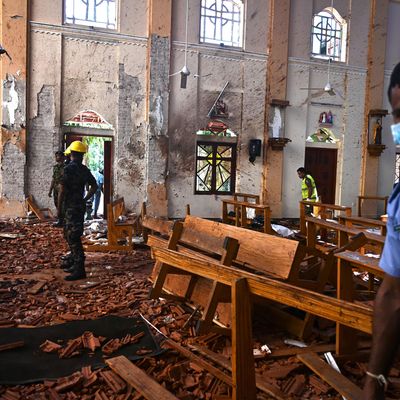
A lot of Americans are understandably weary of conservative Christian self-pity over the indignity of having to share their country with sodomites, feminists, and environmentalists, not to mention the active persecution associated with having to subsidize reproductive medical services, cater to the patronage of same-sex couples, and worst of all, experience wishes for “Happy Holidays” every Christmas season. But as the horrendous Easter Sunday massacres in Sri Lanka illustrated, in many other countries there really is active discrimination against, and sometimes violence targeting, Christians.
Indeed, the Sri Lanka attacks did not come out of a clear blue sky. The country developed a reputation for communal violence during its interminable civil war (which ran roughly from 1983 until 2009), though most of the atrocities reflected the intense battle between the majority ethnic Sinhalese, mostly Buddhist, and the minority ethnic Tamil, mostly Hindu. Still, last year there was a wave of mosque bombings, and in the past Christian churches have occasionally been targeted by local Buddhist and Hindu groups angry about proselytization and conversions. As Reuters reports, such incidents have been common:
Last year, there were 86 verified incidents of discrimination, threats and violence against Christians, according to the National Christian Evangelical Alliance of Sri Lanka (NCEASL), which represents more than 200 churches and other Christian organisations.
This year, the NCEASL recorded 26 such incidents, including one in which Buddhist monks allegedly attempted to disrupt a Sunday worship service, with the last one reported on March 25.
According to the Sri Lankan government, the Easter massacres were actually the work of suicide bombers from a radical Islamist fringe organization; scattered reports suggest that it might have even been an act of revenge for the recent mass murder of Muslims in New Zealand. But regardless of the perpetrators, the attacks reflect an increasingly critical set of problems facing Christians in various parts of Asia, as the New York Times notes:
Over the past year, deadly bombings of churches by militants claiming allegiance to the Islamic State have rocked the Philippines and Indonesia.
In India, the Hindu right, led by Prime Minister Narendra Modi, has targeted Muslim and Christian minorities, the latter group because of its symbolic association with British colonialism.
The ruling party in Bangladesh, the secular-leaning Awami League, has partnered with conservative Muslim clerics who routinely call for the persecution of religious minorities, including Christians.
In Myanmar, Christian minorities fear they will be the next targets of the Buddhist-dominated government.
Anti-religious governments have been a problem, too. North Korea is famously hostile to Christianity. And in China, while persecution of Muslims has gotten the most attention, newly restrictive regulations have affected millions of Christians, particularly those worshipping in smaller, less established churches without official regulation. According to the South China Morning Post, the situation in China is deteriorating rapidly:
Yang Fenggang, the founder of the Centre on Religion and Chinese Society at Purdue University in the United States says: “Under Xi Jinping, the suppression of Christian churches and other religious organisations is being carried out nationwide with unprecedented determination …”
By Open Doors’ [a group dedicated to monitoring anti-Christian persecution] reckoning, more than 20 million [Chinese] Christians experienced persecution last year, and it forecasts that number to increase to 50 million in 2019. It cited the country’s revised Religious Affairs Regulations, which have governed the practice of all religions since the 1980s; an array of crackdowns and raids; and a wave of church closures such as that of Beijing’s Zion Church in September.
“In China, our figures indicate persecution is the worst it’s been in more than a decade — alarmingly, some church leaders are saying it’s the worst since the Cultural Revolution ended in 1976,” said Henrietta Blyth, chief executive of Open Doors UK and Ireland, in a statement.
Violence against the ancient Christian communities of the Middle East is better known, including the persecutions conducted by the Islamic State in Syria and Iraq, and the periodic attacks on Copts in Egypt. Their numbers are steadily dwindling, as the Times of Israel observed last year:
Christians have been rooted in the Middle East as minority communities since the birth of the religion, but their numbers are dwindling amid conflict and jihadist attacks.
Today they make up only four percent of the region’s population, down from 20% before the First World War, Cardinal Kurt Koch, president of the Pontifical Council for Promoting Christian Unity, said this month.
Overall, Christians rival Muslims in having recently become the target of persecution. A 2016 Pew report showed that Christians were the most regularly “harassed” religious group in 144 countries, while Muslims achieved that dubious status in 142. The three countries with the most extensive violence against Christians as of 2018, according to Open Doors, were Pakistan, Nigeria, and the Central African Republic.
Presumably Sri Lanka will soon join the list of countries where martyrdom is a strong possibility for Christians. Their co-religionists in the United States should feel shame for considering themselves the objects of persecution.






























